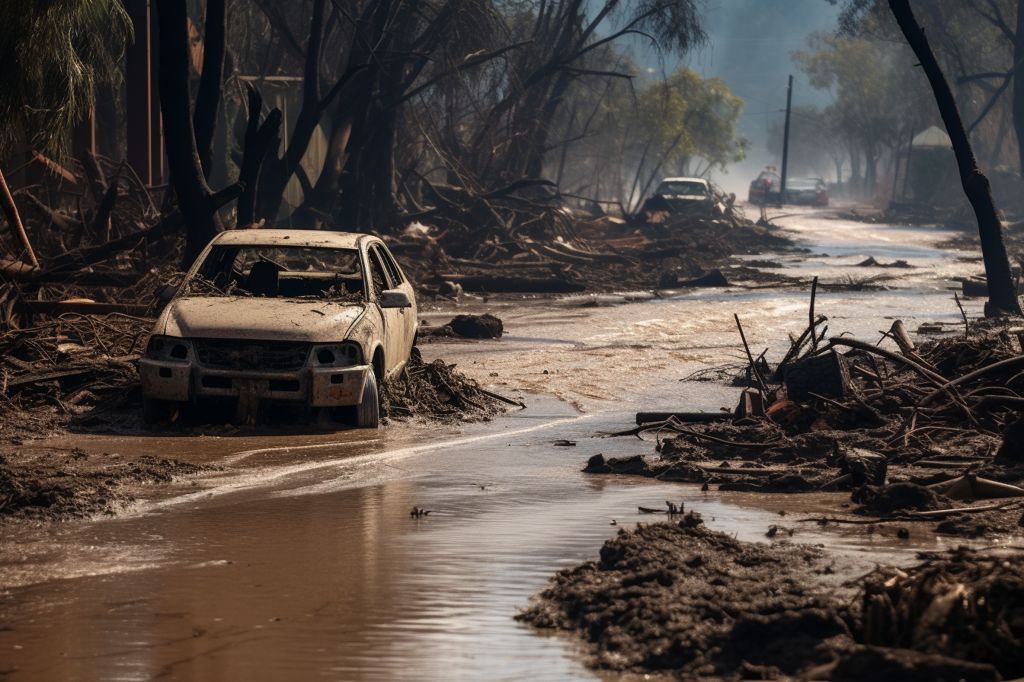The recent severe weather in the Western Cape has caused extensive damage, resulting in the government pivoting from life-saving efforts to recovery and humanitarian aid coordination. The collaborative efforts of numerous disaster units, law enforcement agencies, rescue services, and municipalities throughout the province have been vital in saving lives and delivering aid where needed. As the province progresses in its shift towards recovery, the spirit of teamwork and commitment shown during this crisis demonstrates the resilience and determination of the Western Cape’s residents and authorities.
Navigating the Aftermath of Record Rainfall and Destruction
The Western Cape Government has pivoted from life-saving efforts to recovery and humanitarian aid coordination following the recent severe weather events. Exceptional rainfall has deluged the region, causing extensive damage and necessitating assistance and support for affected communities.
In just three days, from September 24th to 26th, the Overberg region registered a staggering 142.6mm of rain at the new weather station. Stellenbosch saw 194.2mm, and Cape Town’s Molteno recorded 141.8mm, according to the South African Weather Services. This torrential downpour resulted in flooding, landslides, and further destructive consequences, underlining the urgency for swift and all-encompassing disaster response.
Collaborative Disaster Management in Action
The grave situation demanded collaboration among numerous disaster units, law enforcement agencies, rescue services, and municipalities throughout the province. Jointly, they worked relentlessly over the extended weekend to save lives and deliver humanitarian aid where required. Anton Bredell, Western Cape Minister of Local Government, Environmental Affairs, and Development Planning, expressed appreciation towards these devoted individuals and organizations.
Premier Alan Winde also praised the extraordinary efforts of disaster management, law enforcement, and emergency teams. He stressed the need to prioritize resident safety and advised caution as the disaster response shifts towards recovery initiatives. Regrettably, the extreme weather has claimed several lives, and Premier Winde offered heartfelt condolences on behalf of the provincial government to the grieving families.
Addressing Urgent Humanitarian Concerns
Based on data from the City of Cape Town, around 6,000 people have been identified as being in desperate need. This figure is anticipated to increase in the coming days as the situation further develops. The Overberg region has suffered the most, with numerous towns, such as Arniston and Struisbaai, isolated from road access due to closures.
The persistent road closures have hindered support efforts, but Minister Bredell encouraged the public to remain patient during this trying time. Aid varies from supplying essential items to carrying out medical evacuations and airlifts for those in need.
Embracing the Road to Recovery
As the Western Cape progresses in its shift from disaster response to recovery and humanitarian aid actions, the province confronts numerous obstacles. Nevertheless, the unified front exhibited by various government agencies and organizations during these challenging times demonstrates the resilience and determination of the Western Cape’s residents and authorities.
The spirit of teamwork and commitment shown during this crisis underscores the significance of coordination and collaboration among different sectors and levels of government. As recovery efforts advance, it is essential to retain the lessons learned from this disaster and guarantee that future emergency preparedness measures are robust and adaptive.
With the sustained backing of various stakeholders, the Western Cape is well-positioned to not only recuperate from the devastation wrought by the recent severe weather but also to emerge stronger and better equipped for the unknown challenges that may be on the horizon.
1. What caused the Western Cape government to shift from life-saving efforts to recovery and humanitarian aid coordination?
The recent severe weather events, including record rainfall and floods, caused extensive damage and necessitated assistance and support for affected communities, leading to the shift from life-saving efforts to recovery and humanitarian aid coordination.
2. Who collaborated to manage the disaster in the Western Cape?
Numerous disaster units, law enforcement agencies, rescue services, and municipalities throughout the province collaborated to manage the disaster in the Western Cape.
3. What was the role of Western Cape Minister of Local Government, Environmental Affairs, and Development Planning, Anton Bredell, in managing the disaster?
Anton Bredell expressed appreciation towards the devoted individuals and organizations involved in disaster management and encouraged the public to remain patient during this trying time.
4. How many people have been identified as being in desperate need, according to data from the City of Cape Town?
Around 6,000 people have been identified as being in desperate need according to data from the City of Cape Town.
5. Which region suffered the most damage due to the severe weather?
The Overberg region suffered the most damage due to the severe weather, with numerous towns, such as Arniston and Struisbaai, isolated from road access due to closures.
6. What obstacles does the Western Cape confront in its shift towards recovery and humanitarian aid actions?
The Western Cape confronts numerous obstacles in its shift towards recovery and humanitarian aid actions, including sustaining support efforts for those in need and ensuring robust and adaptive emergency preparedness measures for the future.
7. What was the response of Premier Alan Winde to the disaster?
Premier Alan Winde praised the extraordinary efforts of disaster management, law enforcement, and emergency teams, stressed the need to prioritize resident safety, and offered heartfelt condolences on behalf of the provincial government to the grieving families.
8. What lesson can be learned from this disaster for future emergency preparedness measures?
The lesson learned from this disaster is the significance of coordination and collaboration among different sectors and levels of government to ensure robust and adaptive emergency preparedness measures for the future.








